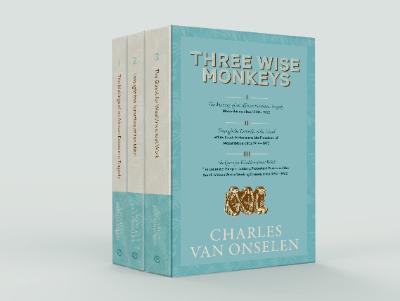It’s about bringing things to life
- Hamilton Wende
Award-wining historian Charles van Onselen shares what he’s learned from the past and the motivation behind his recent trilogy.
Television producer and freelance writer Hamilton Wende (BA 1985, MA 2015) was among the winners at the 2022 Newsmaker and Journalist of the Year awards in the “Print/Online Features/Investigation Journalism category on 20 April 2023. Wende recently interviewed Professor Charles van Onselen (BA Hons 1971) about Three Wise Monkeys (Jonathan Ball, 2023).
Laughter – not an obvious word describing Charles van Onselen, but at a launch for his latest, fascinating trilogy “Three Wise Monkeys”, he had the audience in stitches. He is one of our most notable academic social historians, who has deservedly won several honours for his ground-breaking works, but his conversation, and his writing, is peppered with acerbic satire targeting the powerful.
His latest work is no exception. He traces the relationship between Mozambique and South Africa through the historical approach of the longue durée (long duration) of some 475 years.
It is a serious, deeply researched work, but the title itself reflects his refreshing turn of phrase.
Over coffee at a cafe in his home suburb of Parkview, he tells me with a straight face that many white South Africans went to Catholic, more free-wheeling Maputo (Lourenço Marques) to escape the racist confines of Calvinist, Protestant, apartheid-ruled South Africa. “They were looking,” he says, “for horizontal explorations,” with, of course, the darker-skinned women they met at clubs and bars in the tropical, coastal city.
His eyes sparkle with humour, but take on an intensity as we discuss the impressive depth of his work: “I’m interested in the everyday background of social life, and trying to understand the deep forces that work below the surface. And one of the things that is well-documented in South African historiography is the rise of a police state in the 1960s. When the state centralises in that way through the police and the military, simultaneously it does it socially. It restricts social behaviour.”
In his trilogy he outlines just how life in South Africa was restricted by the rise of Calvinist extremists and how this was not the case in Catholic Mozambique.
He describes the restrictive SABC as opposed to LM radio and its playing international pop music that South Africans were denied by the state broadcaster, the opposition to the Lourenço Marques Lottery by the apartheid authorities, and the effect of tourism – horizontal and other – by white South Africa to Mozambique.
The nub of his story, though, is the cruelty of the migrant labour system imposed on black Africans. The white governments in both countries chose not to see, hear or speak evil of one another’s opposing social mores so not to threaten the flow of cheap workers into the mines – Kimberley and the Rand.
“The mines cannot work until well into the 1960s without Mozambican labour,” he says. He connects this decades-long flow of poorly paid recruits to the deep and awful roots of the slave trade in which Mozambique and its Portuguese rulers played a brutal part as late as 1878.
What links the two countries is the exploitation of Africans, albeit in differing European cultural guises.
The notion of two meaningful, distinct nation-states he deconstructs fiercely. “Prior to the discovery of minerals, you never had the economic power to assemble powerful states. Gold and diamonds were central to the South African state. Now, after the somewhat arbitrary date of 1994 we are regressing, and we see the erosion of the state to something like prior to 1910. We can’t protect the borders here. People just come. There are major criminal patterns across the Mozambican border now. But,” he adds. “from the beginning white South Africans were completely complicit in all the illegal activities that came from Mozambique.”
He goes on to explain why he wrote this trilogy: “I want a cohort of especially white South Africans to understand that their everyday life was deeply rooted in the oppressive nature of the white South African state, and it wasn’t innocent.”
It is a powerful, extremely readable, work that opens up a little-considered part of our history. “LM” wasn’t just beaches, peri-peri prawns and new friends. There were deeper forces underneath it all.
“I am less interested in writing for academics.” He looks around the café, “than I am in getting the lady over there to buy a book and say, you know, history is also exciting and it’s about me, not the Prime Minister who is actually part of the problem.”
Storytelling and what he has learned about the past is his deepest passion: “Bringing things back to life, that’s really lovely.”
- This interview was first published in the Sunday Times

